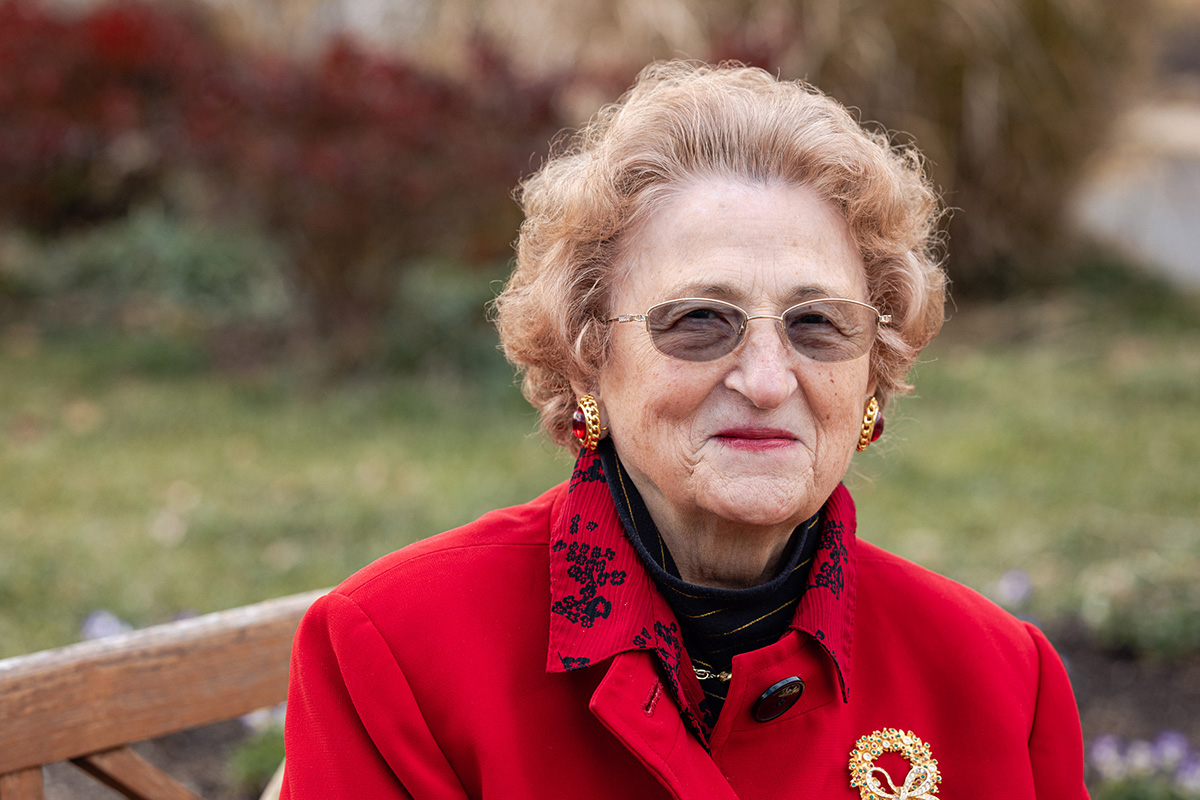
Vinod Balachandran, MD, is leading a clinical trial testing whether mRNA vaccines — the same technology used to create COVID-19 vaccines — can prevent pancreatic cancer from returning after surgery.
For Barbara Brigham, being diagnosed with stage 2 pancreatic cancer in the fall of 2020 was a devastating blow in an already rough year. She had just lost her mother and husband after long illnesses, with both needing extensive care. The 74-year-old semiretired librarian from Long Island was finally starting to focus on her own health needs. The outlook seemed grim.
But her Memorial Sloan Kettering Cancer Center (MSK) doctor, Vinod Balachandran, suggested that in addition to surgery and chemotherapy, Barbara try something new: a small, preliminary clinical trial testing a vaccine using messenger RNA (mRNA) technology — the same technology used to create the COVID-19 vaccine.
There are essentially two kinds of vaccines — those given as a precaution to prevent infection and those that are therapeutic and given after someone is sick. Barbara would receive a therapeutic mRNA vaccine to train her immune system to be on the alert for cancer cells. It might reduce the risk that her cancer would return.
“I don’t think there was any hesitation about joining the trial,” Barbara says. “I had complete confidence in Dr. Balachandran. He said I would be a great candidate, and my son, who was with me, agreed it was the best way to go.”
Pancreatic cancer is projected to become the nation’s second leading cause of cancer death within 10 years. But MSK investigators are making encouraging advances against the disease on many fronts.
Studying the Origins and Progression of Pancreatic Cancer
Investigators at the Sloan Kettering Institute (SKI) and across MSK are discovering how pancreatic cancer starts and progresses. Experts in pathology, cancer genetics, computational biology, and clinical oncology are closely collaborating within the David M. Rubenstein Center for Pancreatic Cancer Research, overseen by physician-scientist Christine Iacobuzio-Donahue (David M. Rubenstein Chair).
“MSK is extraordinary in terms of the infrastructure, the resources, and the talent across different specialties for every aspect of pancreatic cancer,” Dr. Iacobuzio-Donahue says. “As a pancreatic cancer researcher, it’s a very exciting time for the field. I think it’s just a matter of time until we crack this.”
Figuring out the origins of the disease is crucial. Pancreatic cancer is usually diagnosed very late, making it difficult to treat. Inside the SKI lab of cancer biologist Scott Lowe (Geoffrey Beene Chair), researchers are zeroing in on the disease’s earliest stages.
“If we understood how these tumors form, we might catch them before the cancer has spread to an incurable stage,” says Direna Alonso-Curbelo, a former postdoctoral fellow in the Lowe Lab.
Because cancer often forms at the site of tissue damage, researchers study whether that damage may trigger cancer. Genetic changes also contribute to cancer development. The mystery is how these two factors combine to cause the disease.

Barbara Brigham
Using innovative mouse models and advanced techniques to understand the interactions of genes, Dr. Alonso-Curbelo and colleagues in Dr. Lowe’s lab were able to discern how tissue damage synergizes with specific genetic changes to promote the earliest stages of pancreatic cancer.
Think of it as wound repair gone awry. Digestive enzymes can inflict damage, which the pancreas tries to fix. During the repair response, the cells in the damaged area change their behavior. They temporarily shut down their production of digestive enzymes and take on a different form. Once the damage has been resolved, they return to their normal functioning.
However, if the cells in the damaged area contain a mutation in a gene called KRAS, the normal wound-healing response goes haywire and the cells don’t return to normal. The research team was able to identify specific changes that explain how the normal repair process turned into a cancer-initiating one. The discovery opens up the possibility of blocking cancer development by interfering with the activation of genes that become inappropriately turned on.
How Decades-Old MSK Research Paved the Way for New Therapies
Earlier research at MSK already paved the way for therapies to treat certain patients with pancreatic cancer. In the early 1990s, Maria Jasin, a member of the Developmental Biology Program at SKI (William E. Snee Chair), made groundbreaking discoveries about how DNA fixes itself when it becomes damaged. This helped researchers understand the role of the BRCA1 and BRCA2 genes, which repair DNA.
Based on her findings, scientists began developing a class of tumor-fighting drugs called PARP inhibitors for patients with a BRCA mutation. In 2019, nearly three decades after Dr. Jasin’s initial discovery, the FDA approved the PARP inhibitor olaparib (Lynparza®) for people with metastatic pancreatic cancer who have an inherited BRCA mutation.
“You can see the thread leading from Maria’s major body of work to this class of drugs, from her laboratory bench to the patients’ bedside,” Dr. Balachandran says.
Another way to target pancreatic cancer cells is through a genetic abnormality called a mismatch repair (MMR) deficiency. Research first led by MSK medical oncologist Luis Alberto Diaz, Jr. (Grayer Family Chair), when he was at Johns Hopkins, discovered that patients with MMR-deficient cancers respond well when treated with the immunotherapy drug pembrolizumab (Keytruda®). Now patients found to have MMR-deficient tumors can receive pembrolizumab as a standard treatment.
“Even though pembrolizumab has helped only a small fraction of people with pancreatic cancer, it proved that immunotherapy can actually work for this disease,” Dr. Balachandran says.
How Pancreatic Cancer Survivors Inspired New Research
Some people with pancreatic cancer manage to beat the odds and survive. Researchers in Dr. Balachandran’s lab discovered in 2017 that these patients’ tumors contained proteins, called neoantigens, which immune cells recognize as being especially foreign. These conspicuous targets provoked the immune system to attack, keeping the cancer at bay.
Soon Dr. Balachandran was collaborating with researchers at the German drug company BioNTech to make a vaccine based on neoantigens. By 2019, they had created an mRNA vaccine and set up a clinical trial for 20 patients, including Barbara, to test if it was safe.
The scientists analyzed the genes of each patient’s tumor to look for the neoantigens most easily targeted by their immune system. Each patient received a custom vaccine based specifically on their tumor’s molecular fingerprint.
Dr. Balachandran completed the trial in 18 months, a full year ahead of schedule despite the COVID-19 pandemic. In June 2022, he presented encouraging results from the trial at the annual meeting of the American Society of Clinical Oncology: For 8 of 16 patients studied, the vaccines activated T cells that recognize the patient’s own pancreatic cancers. These patients also showed delayed recurrence of their pancreatic cancers, suggesting the T cells activated by the vaccines may be having the desired effect to keep pancreatic cancers in check.
So far, Barbara is healthy since completing her treatment in September 2021. She received nine vaccine doses, in addition to chemotherapy and a single dose of immunotherapy — most of it at MSK Commack, an outpatient center on Long Island. Like the other people in the trial, she has a CT scan every three months to see if the cancer returns.
“I feel very well so far, and for now there is no detectable cancer,” she says. “I had a unique support system from my family, who have helped me through this. I’m enjoying the time I get to spend with them as well as my grandkids — the little things I’m grateful to be around for.”
“A lot of people thought this trial would not be possible,” Dr. Balachandran says. “But we have a phenomenal staff, and we’re able to do these trailblazing clinical trials using this new mRNA technology.” In his quest to make the vaccine better, he published new research in May 2022 that suggested ways to choose the best neoantigens.
He is hopeful the vaccine will lead to a new wave of treatments benefiting more patients.
“The earlier discoveries that led to treatment with PARP inhibitors and immunotherapy drugs apply to a fairly small subset of patients,” says Dr. Balachandran. “We still need something for the bigger fraction. We’ve begun to take the next step.”






